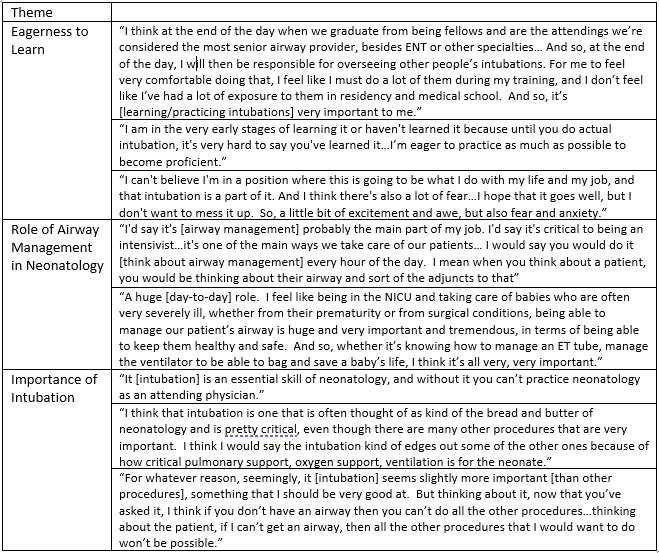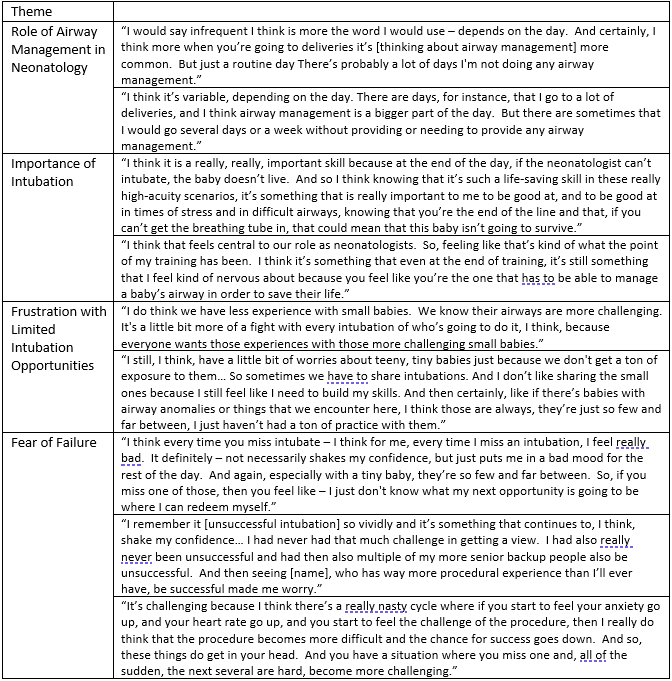Neonatology
Session: Neonatal-Perinatal Health Care Delivery: Practices and Procedures 1
443 - Exploration of Neonatal Fellows’ Perceptions of Intubation (Neo- POPPINS: Neonatal Providers’ Perceptions of Intubation Study)
Monday, May 6, 2024
9:30 AM - 11:30 AM ET
Poster Number: 443
Publication Number: 443.3229
Publication Number: 443.3229
- MO
Mackenzie O'Reilly, BA (she/her/hers)
Clinical Research Coordinator
Childrens Hospital of Philadelphia
Conshohocken, Pennsylvania, United States
Presenting Author(s)
Background: Decreased incidence of neonatal intubation combined with a growing number of neonatal nurse practitioners and physician assistants have created a mismatch between number of providers and number intubations. Neonatal fellows must now achieve intubation competency within this environment of increased competition for fewer intubations. Little is known about the impact of this environment on fellows’ perceptions of neonatal intubation.
Objective: To explore neonatal fellows’ perceptions of and experiences with intubation during fellowship.
Design/Methods: A grounded theory qualitative study of first (n=5) and third (n=5) year neonatology fellows training at both a level 3 and 4 NICU. The fellowship program guarantees an initial five protected intubations after which the airway provider is determined through a discussion amongst present providers. Participants completed a one-on-one semi-structured interview exploring perceptions of and experiences with neonatal intubation. A qualitative researcher analyzed interview transcripts in ATLAS.ti V7 using coding and analytical memos. We generated salient themes using constant comparative method. Interviews were conducted until thematic saturation was achieved.
Results: First year fellow interviews took place in the first month of fellowship and only two (40%) had prior neonatal intubation experience. First years conveyed an eagerness to learn intubation, a skill they deemed imperative to and even synonymous with neonatology (Table 1). While third year fellows acknowledged intubation as the most important procedural skill, they viewed airway management as a component of their job rather than the sole focus of neonatology as compared to first years (Table 2). Third year fellows expressed frustration and anxiety with limited opportunities to perform intubation during training. They also expressed difficulty recovering from unsuccessful intubations and fear of future failures as they become attending neonatologists.
Conclusion(s): Neonatal fellows view intubation as the most important procedure to learn during fellowship. Limited intubation opportunities create anxiety for third year fellows about their ability to achieve and maintain competency as they transition to attending neonatologists. Despite acknowledging airway management as solely a component of their job, third years describe significant difficulty recovering from failed intubations. Specific interventions to support fellows through failed intubations and allay third year fellows’ fears are necessary to facilitate their transition to attendings.


